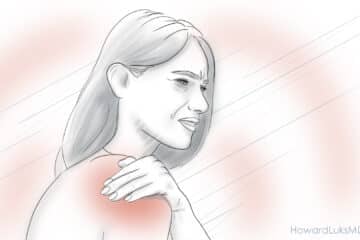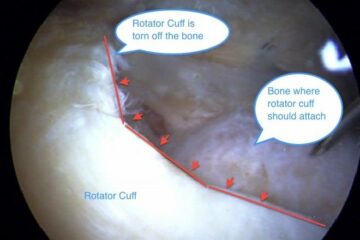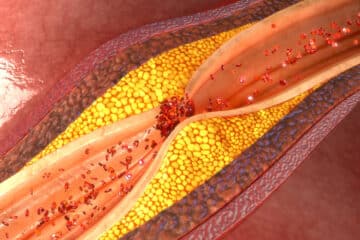
Shoulder pain is very common. Should we obtain an MRI on everyone with shoulder pain?
The quick and obvious answer is no … but let’s explore why.
- The rotator cuff is the most common source of pain in patients over the age of 30.
- Rotator cuff tears are very common in people over 40.
- The majority of rotator cuff issues are due to degeneration or attrition of the rotator cuff.
- Many degenerative or attritional rotator cuff tears do not need surgery and your pain will improve with physical therapy.
In my everyday life I see two types of people, those with shoulder pain and those who will have have shoulder pain. For most of you, your shoulder pain will subside spontaneously. Many of you will need to see a doctor because your shoulder pain will keep you up at night or make it difficult for you to continue with your daily activities.
What should your doctor do?
Should We MRI All Shoulder Pain?
Today we continue with our Expert Series where 4 Orthopedic Surgery experts in the area of shoulder surgery will continue answering a number of questions about the rotator cuff.
Jeffery Berg, MD: Website, Twitter
As with most diagnosis in medicine, for shoulder problems the patient’s “story” is usually the most important factor in determining the diagnosis. For me, the exam is then next most important. After that the response or failure to treatments (if appropriate for nonoperative care) and finally, imaging studies, including MRIs. In most shoulder problems, MRIs are typically only confirmations of the suspected diagnosis. In younger patients, MRIs are only fair in their ability to accurately identify the common shoulder problems this age group suffers. In older patients, because of the common and often asymptomatic “wear and tear” that is common in these patients, MRI’s often overemphasize the importance of common asymptomatic issues, such as degenerative rotator cuff tears. These are incidentally identified and often do not require any treatment.
As a result, in most cases I try to develop a diagnosis from the history and exam. I use MRIs with shoulder problems in the following situations: 1) Concern for time sensitive or limb or life threatening diagnosis that is unclear from the history and physical exam, 2) Failure to respond to nonoperative treatment and the diagnosis still remains unclear, 3) Need to better define, classify or further assess a known diagnosis, and 3) Preoperative surgical planning (for both me and my patients).
Scott Slattery, MD: Website, Twitter
MRI is currently the best way to image the rotator cuff tendons. Not every shoulder pain patient needs an MRI. A good history and physical exam will usually lead to a reasonable diagnosis without advanced imaging. Deciding to obtain a MRI depends on many factors including the time course and severity of the problem, patient age and activity level, and patient desires. Many painful conditions of the shoulder will respond well to non-surgical treatment. If there is no suspicion that there is a serious underlying problem and/or the problem has been present for a short time, a MRI is usually not necessary. If it seems like there is a serious problem that may require surgery or longstanding pain is continuing and increasing despite good care, a MRI may be appropriate.
Marty Leland, MD: Website, Twitter, Facebook
When I first see a patient over 40 with shoulder pain, my first treatment is anti-inflammatories, physical therapy, and frequently a subacromial steroid injection. I will then see the patients back 6-8 weeks later. If they are much better, there is no need for any further treatment. If they aren’t much better, I get an MRI to evaluate their rotator cuff. I usually do not order an MRI the first time I see them because, even if they do have a small rotator cuff tear, I would like to see if non-operative treatment would help them. If it does, GREAT! They may have avoided a surgery. I only order MRIs if they aren’t getting better. However, if I have a patient with a long history of shoulder pain and weakness and they are very weak on examination, I sometimes do order an MRI after the first office visit.
Derek Ochiai, MD: Website, Twitter
Because a good history and physical examination are very good at picking up shoulder rotator cuff issues, I typically do not initially get an MRI of a shoulder I’m trying to treat non-operatively. I use MRI’s when the diagnosis is in doubt or for pre-surgical planning. If the patient had a violent trauma with a lot of shoulder dysfunction, I might get an MRI in that setting, as acute rotator cuff repair for a complete tear would be reasonable. Likewise, if the patient is an overhead athlete with months of shoulder pain before I see them, I might get an MRI or even an MRI arthrogram (where dye is injected into the joint), to look for a SLAP tear (tear of the labral cartilage), which can occur with internal impingement.
Everyone who presents to an Orthopedist’s office with shoulder pain will not require an MRI. As our experts discussed, we may choose to MRI your shoulder if :
- Your diagnosis is in doubt
- You have not responded to physical therapy and we want to assess the quality of your rotator cuff
- You have suffered a severe injury and present with weakness
Next time you visit an Orthopedist for shoulder pain do not be upset if they do not order an MRI. They are rarely necessary to successfully treat the majority of people with shoulder pain.












Would a rotator cuff tear cause the back side of my arm to burn?
hard to say … but it is possible. Burning pain is associated with inflammation and nerve pain— so a good examination can usually tell which one is bothering you.
Hello, Dr Luks,
A month ago tomorrow, I fell flat out on a hard floor and dislocated my right shoulder. I spent a few hours in an ER. and they put it back in place. Since then, I went to 6 sessions of PT. I do exercises at home as well.
I still have a lot of pain in the wee hours at night. There is improvement in my range of motion, maybe 25%.
I feel I need an MRI to assess the damage of the tendons. Any arm movement to the side is still painful .
I do not want surgery if I can avoid it. How many weeks of PT would I need to see bigger results?
Is it a matter of time? And when is it too late to have surgery ?
I’m a 73 year old female, in good shape otherwise. I still ran 9 short footraces in 2016. Never had any major illness. Is it possible to get 90% of range of motion back without surgery?
Thank you for your reply !!
An MRI following a shoulder dislocation in a 73 year old is generally best down earlier rather than later…. that’s because many 60-80 year olds will tear off a large portion of the rotator cuff when the shoulder dislocates.
Good Luck
Also Dont believe ever put back into place how would I even know if it was dislocated in the first place?
A good exam by a shoulder doc can usually tell if you had a previous dislocation. The X-ray will also tell if you had a previous dislocation.
I was in a roll-over car accident in 2012 – I was not wearing a seat belt. At first my pain was thought to be from my neck, within months it was concluded my shoulder was also involved. 5 years and several X-rays and 2 MRIs later my diagnosis is still unsure. The pain gets much better if I don’t use my arm – usually during winter months. At todays app. I could not lift my arm to the side above my shoulder. Now they want to do another X-ray. I have a total of over 116 mSv of radiation over my life from thyroid cancer and CT scans among others. Is another X-ray necessary?
Xrays are a very useful screening tool for shoulder injuries.
I don’t know what’s wrong with my arm it started about 2 months ago I was trying to pick up a door to move and something happened to my right arm, the next day my bicep was black and blue, and ever since that it hurts all the time I can’t pick anything up with my hand without pain going all the way up to my shoulder I can’t sleep for the pain I have to set up , when I try to raise my Are even with it bent it hurts terrible getting no better what should I do?
Time for a Sport Medicine Doc with a shoulder specialty to take a look and see what’s bothering you.